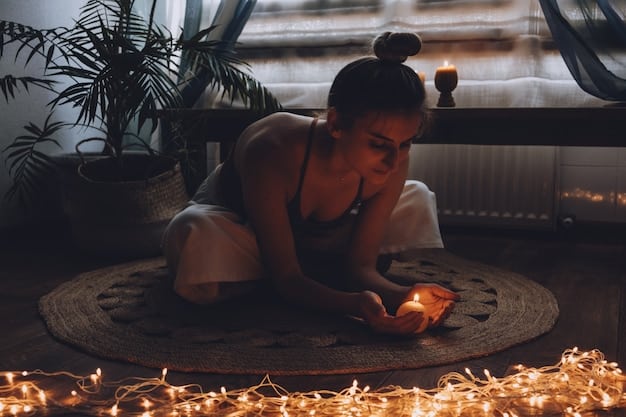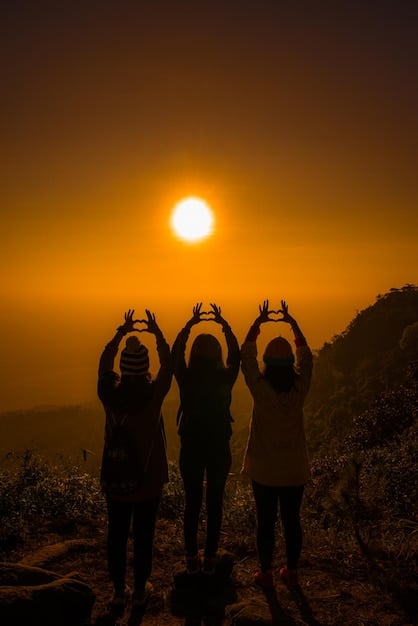The Profound Role of Ritual in Spiritual Practice: Meaningful Ceremonies for Growth

Rituals in spiritual practice serve as structured actions and symbols connecting individuals to deeper meanings, fostering personal growth, community, and a sense of the sacred through purposeful engagement and symbolism.
Are you seeking a deeper connection to your spirituality? Understanding what is the role of ritual in spiritual practice? Creating meaningful ceremonies can be a transformative step in your journey.
Understanding the Essence of Ritual in Spiritual Growth
At its core, a ritual is more than just a routine; it’s a deliberate sequence of actions imbued with symbolic meaning. These actions, often performed in a specific setting, are designed to connect participants with the sacred or spiritual realms, fostering a sense of unity, purpose, and personal transformation.
Understanding the essence of rituals allows us to appreciate how they create a bridge between our everyday experiences and deeper spiritual truths. They invite mindfulness, provoke reflection, and promote inner peace.
Key Elements of a Spiritual Ritual
Spiritual rituals vary greatly, but they often share core elements. Recognizing these can help in understanding and creating your own rituals.
- Intention: Every ritual starts with a clear intention, defining its purpose and desired outcome.
- Symbolism: Rituals use symbols – objects, gestures, words – to represent deeper spiritual concepts.
- Repetition: Repeating actions or mantras anchors the experience, reinforcing the intention and deepening focus.
- Community: Rituals can be solitary or communal, the latter fostering a sense of belonging and shared spiritual experience.
These elements create a framework where the participants can engage with their spirituality in a structured and purposeful way. When combining these elements, the ritual becomes a powerful tool for bringing the participant closer to the divine.

The Psychological and Spiritual Impact of Rituals
Rituals have profound effects on both the psyche and the spirit. From a psychological perspective, they provide structure, reduce anxiety, and offer a sense of control, particularly in times of uncertainty. Spiritually, they serve as conduits to higher consciousness, invoking feelings of awe, gratitude, and interconnectedness.
Understanding these impacts can deepen our appreciation for the importance of rituals in maintaining mental and spiritual well-being, and can lead the participant to have a better connection with its divine.
Psychological Benefits of Rituals
From a psychological standpoint, rituals meet core human needs, like the need for safety, love and belonging.
- Reducing Uncertainty: Rituals provide a predictable framework in a chaotic world, helping to manage anxiety.
- Creating Mental Space: Engaging in a ritual allows one to set aside daily concerns, fostering mindfulness and presence.
- Enhancing Self-Efficacy: Completing a ritual can boost self-esteem and provide a sense of accomplishment.
Rituals provide both a framework that the participant can attach to and a sense of accomplishment when the ritual comes to an end, creating in participants the desire to engage more with the divine.
Designing Your Own Meaningful Ceremonies
Creating your own rituals can be a deeply personal and empowering process. It allows you to tailor the spiritual practice to resonate with your specific needs, beliefs, and intentions. Whether it’s a daily gratitude practice, a seasonal celebration, or a unique ceremony for personal milestones, the key is to make it authentic and meaningful to you.
Designing your own ceremonies allows you to cater the spiritual practice to your specific needs and beliefs, and allows the participant to be more engaged with the ritual.

Practical Steps to Create a Ritual
Designing a ritual requires careful consideration and planning. Here are some practical steps to guide you in the process:
- Define Your Intention: Start by clearly stating what you want to achieve or celebrate through the ritual.
- Choose Symbolic Elements: Select objects, words, and actions that have personal resonance and support your intention.
- Create a Structure: Plan the sequence of events, ensuring a clear beginning, middle, and end to provide a sense of completion.
Putting effort in the planning of a ritual is a way to honor the divine and create the best experience for the participant. The practical steps ensure that the ritual is meaningful and aligned with the participants goals.
Rituals Across Different Spiritual Beliefs
Rituals take diverse forms across different spiritual traditions, each reflecting unique cultural and philosophical beliefs. From the elaborate ceremonies of indigenous cultures to the meditative practices of Eastern religions and the sacramental rituals of Christianity, each tradition offers a wealth of practices designed to connect with the divine and foster spiritual growth.
Exploring different belief systems can help one find a ritual that aligns with its values and beliefs and can lead to a better experience with the divine.
Examples of Rituals in Various Traditions
Looking at examples from other systems can help the participant to understand the universal meaning of rituals.
- Indigenous Cultures: Often feature communal dances, drumming, and offerings to honor nature spirits and ancestors.
- Eastern Religions: Include meditation, yoga, chanting mantras, and creating mandalas for inner peace and enlightenment.
- Christianity: Center around sacraments like communion, baptism, and liturgical celebrations to embody faith and community.
These traditions create a bridge between the participant and the divine, honoring both the divine and the system’s heritage. These can also be a great source of inspiration to create a personal ritual.
Incorporating Rituals into Daily Life for Sustained Spirituality
Integrating rituals into your daily routine is a powerful way to cultivate sustained spirituality. These small practices can bring moments of mindfulness, gratitude, and connection with the sacred into ordinary moments, helping to maintain spiritual well-being over time.
Incorporating rituals into daily life can create a more mindful life, bring peace and connection with the divine and promote sustained spirituality across time.
Ideas for Daily Spiritual Rituals
Small rituals can carry a big importance, especially when practiced with intention.
- Mindful Morning Routine: Start the day with meditation, journaling, or gentle stretching to set a positive tone.
- Gratitude Practices: Before bed, reflect on three things you’re grateful for to cultivate appreciation and positivity.
- Nature Connection: Take a few minutes each day to connect with nature, whether it’s a walk in the park or tending to indoor plants.
These rituals can be easily implemented and are a small way to constantly celebrate the connection with the divine. Regular practice will bring mindfulness and enhance spirituality day after day.
| Key Point | Brief Description |
|---|---|
| ✨ Essence of Ritual | Structured action with symbolic meaning; connects with the sacred. |
| 🧘 Psychological Impact | Reduces anxiety, provides structure, and creates mental space. |
| ✍️ Creating Ceremonies | Define intention, choose symbolic elements, and create a structure. |
| 🔄 Sustained Spirituality | Incorporate rituals into daily life for continuous mindfulness. |
FAQ
The primary role of ritual is to connect people with the divine or sacred in a structured and meaningful way, facilitating personal and communal spiritual growth.
Rituals can reduce anxiety by providing a sense of structure and predictability, offering moments of mindfulness and inner peace in daily life.
Yes, anyone can create their own ritual by defining an intention, selecting symbolic elements, structuring the actions, and participating with full meaning.
Repetition helps anchor the experience, reinforcing the intention and deepening focus, leading to a more profound spiritual connection for the practitioner.
Daily rituals maintain spiritual well-being by integrating moments of mindfulness, gratitude, and connection with the sacred into ordinary life through these rituals.
Conclusion
In conclusion, understanding what is the role of ritual in spiritual practice? Creating meaningful ceremonies allows us to appreciate their importance in fostering spiritual growth, mental well-being, and communal connection. By incorporating these practices into our lives, we can connect deeply with our beliefs.





